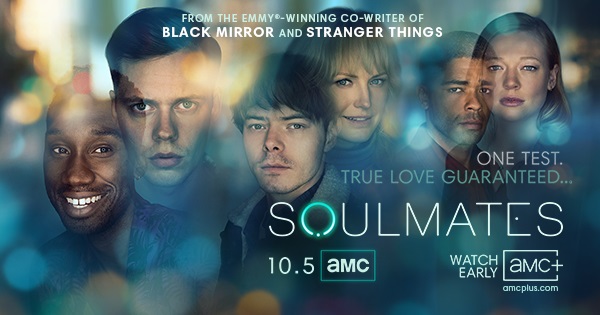To make the show, you have to sell the show. That’s the nature of the beast. Being able to sum up the complex, multi-layered story or stories you want to tell in a zippy, comprehensible pitch is a skill that’s not only useful, but vital; nor is it a skill in any way opposed to creativity, ambition, or depth of thought. Vince Gilligan’s “Mr. Tibbs into Scarface” pitch for “Breaking Bad” has become the stuff of legend, for example. But there are also times when being able to sum up the whole idea in a neat package can get you into hot water. Any guesses this writer might make as to what befell “Soulmates,” AMC’s new, frustratingly repetitive series, would be just that: guesses. But it’s not difficult to imagine co-creators William Bridges and Brett Goldstein selling a room on “Black Mirror but instead of new technologies every episode, it’s always the same technology spinning off endless stories” and walking off with extra pep in their step, only to realize that maybe making the same “Black Mirror” episode over and over again isn’t quite the home run they’d hoped it would be.
That’s not to say there’s nothing to be admired in “Soulmates.” Quite the contrary. But sometimes the first idea is just the ladder you climb to get to the next idea, and once you’re safely up there, those steps become redundant. In this case, that first idea is Soul Connex. Set 15 or so years in our future, the series hinges on the idea that scientists have identified the “soul mate gene,” and Soul Connex is the 23AndMe-adjacent test—typically simply called “the test” in the world of the show, which should give you an idea of its ubiquity—that connects people through this gene. In its first six-episode season (AMC has already renewed it for a second) “Soulmates” tells some of the stories one might immediately expect from the premise, and one or two which feel far more original. But despite the promise of those episodes which fall into the latter category, and despite the uniformly excellent acting (just wait ‘til you read the cast list), it’s hard not to walk away feeling as if you’ve spent hours watching the writers attempt to free themselves from their pitch.

It’s too bad, because once Bridges, Goldstein, and the rest of the show’s writers give up on trying to be “Black Mirror” and wander instead in the direction of “The Twilight Zone” and “The Outer Limits” that things get really interesting. (The “Black Mirror” comparison is unavoidable, and that would be true even if Bridges hadn’t won an Emmy for that show’s “U.S.S. Callister.”) You could tell me that the first episode, the Sarah Snook-anchored “Watershed,” was excised whole cloth from a season of Netflix’s tech-centric anthology and I would have no trouble believing you; the last, “The (Power) Ballad Of Caitlin Jones,” on the other hand, feels wholly anchored in its own atmosphere and tone. The four episodes in between waffle, sometimes within the episodes themselves, from territory that’s frustratingly derivative to thoughtful and surprising, even if those more thoughtful moments are rarely also subtle. There’s Soul Connex: “Oleanna” edition, Soul Connex: “The Leftovers” edition, and one particularly fun installment (the only fun one in the bunch, really) that somehow manages to blend a bit of Linklater’s Before trilogy with Paul Feig’s “The Heat” and Wong Kar-Wai’s “Happy Together,” if you can believe it.
It’s a lot. And it’s to the credit of the show and its cast—the latter in particular—that it’s approached as such. Snook’s turn in “Watershed” is so good that it’s almost easy to overlook how pat the episode itself feels, particularly in its final act; she fills every moment, even when the writing can’t seem to keep up. The same is true of AMC darlings David Costabile (“Breaking Bad”) and Sonya Cassidy (a marvel in the gone-too-soon “Lodge 49”) in the acidic “The Lovers,” which sees a presumably happily married college professor on the precipice of tenure run headlong into the soulmate he hoped never to meet; not even Cassidy’s laserlike focus can make up for the questions this one fails to ask, but it’s a hell of a performance all the same.
The sleek near-future visual world established in “Watershed” changes little in either “The Lovers” or the appealingly straightforward but ultimately flimsy “Little Adventures”—it exists somewhere between “Minority Report” and an ad for a fancy toothbrush subscription service on Instagram—but things shift more dramatically in the Marco Kreuzpaintner-directed “Layover,” in which a traveling Bill Skarsgård has a dalliance with a handsome fellow tourist (“Misfits” alum Nathan Stewart-Jarrett). “Layover” is the episode least concretely tied to the premise of “the test;” substitute the word “fiancé” for “soulmate” and you’ve got a comfortable rom-com on your hands. Perhaps it’s this distance that allowed Kreuzpaintner to embrace variations in color, tempo, and light.

The less said about the final two episodes of the season—“Break On Through,” the Charlie Heaton/Malin Ackerman-starring hour which asks what becomes of people who take the test and discover their soul mate has died, and the previously mentioned and engagingly weird “(Power) Ballad”—the better, if only because each ultimately heads to some unexpected places, and surprises aren’t all that commonplace in this series. The former does a nice job of allowing its most predictable developments to heighten the tension throughout, the latter benefits both from asking the season’s most unlikely question and from an utterly magnetic performance from Betsy Brandt (“Breaking Bad”) who once again demonstrates her ability to lace the tragic and the terrifying with an undercurrent of dark humor. She’s a standout among standouts, and so the episode is, too.
“Soulmates” could stand to learn a lesson or two from Brandt. It’s clear that Bridges and Goldstein know how to write great scenes for great actors, and if for no other reason, that alone makes this series worth a look. But only rarely does it give itself over to the messy, often contradictory reality of being alive, as Brandt so ably does throughout her episode. “Soulmates” is more interested in the just-so ending, the perfect piece of dramatic irony or the last little twist, than it is in that complexity; let’s hope in that already-promised second season they manage to step away from their clever conceit and into the wilds of their own world a bit more frequently.
Whole season screened for review.












